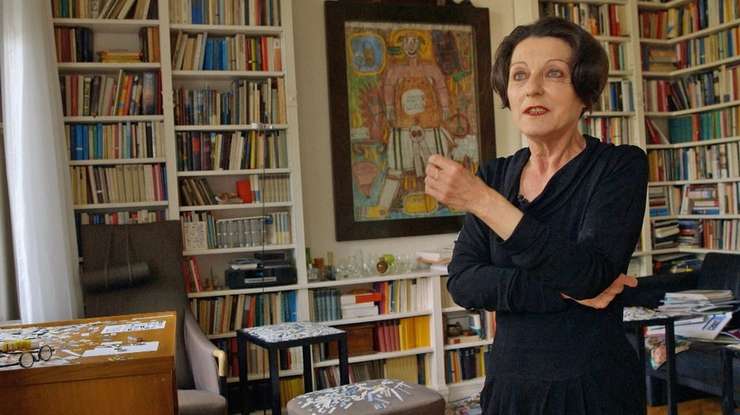The Herta Müller Ad-hoc Collection at CNSAS (the Romanian acronym for the National Council for the Study of the Securitate Archives – Consiliul Național pentru Studierea Arhivelor Securității) reflects the development of her cultural opposition from the perspective of the Romanian secret police, the Securitate. The documents of the collection show that the Securitate took notice of the non-conformist and potential damaging content of her writings about “socialist reality” and intensified their informative surveillance of her as her prose reached a larger and more international audience. Of the five fonds of the archives of the former Romanian secret police, the Securitate, the documents of the Herta Müller Ad-hoc Collection at CNSAS can be found only in the Informative Fonds.
Herta Müller’s “informative surveillance file” (In Romanian dosar de urmărire informativă) contains three volumes and was registered under the code name “Cristina.” The first volume opens with the official decision to begin informative surveillance against the name of Herta Müller in February 1983. The decision was motivated by the fact that in her writings published in Romania in the previous year she approached “subjects with social and economic content, slipping in interpretative and tendentious ideas about our state.” The delay between the publishing of her first book Niederungen (Nadirs) and the opening of informative surveillance was due to the fact that the predominantly ethnic-Romanian Securitate had to rely on translators in order to deal with the literary works of German authors. As a result, the documents that follow in the file are notes from German-speaking sources and informers collected before the opening of informative surveillance. They underline how Herta Müller’s short stories allegedly distorted “the social-economic realities (…) especially in rural areas” and misrepresented and sometimes openly mocked the local state and party authorities. The file includes a plan of measures for organising the informative surveillance of Herta Müller, involving an exhaustive collection of information about her personal and professional life. Special attention is given to her professional status, as many informative notes covering the last part of the year 1983 record her losing her job as a teacher of German language in a high school in Timișoara. Also during 1983, the Securitate continued to collect reports from its sources and informers about Müller’s non-conformist writings. The turning point in their informative surveillance of her came at the beginning of 1984 when the Securitate found out that a West German publishing house was interested in re-publishing her first volume. Thus, the following documents, mostly reports and informative notes covering the entire year of 1985, trace the growing concern of the Romanian secret police in the face of the enthusiastic reception of Müller’s novel in the German world. Indeed the Securitate intercepted and translated her personal correspondence with the German publishing house who had published Niederungen (Nadirs) and with other cultural institutions that invited the Romanian writer to their events. Her literary success abroad contrasted greatly with her increasing professional marginalisation. Informative notes record how Herta Müller was forced to resign from her positions as she constantly refused to comply with the official requirements concerning her teaching activity. The Securitate documents, especially the notes of analysis regarding the development of the informative surveillance, together with reports and informative notes covering the years 1985 and 1986, mention that Herta Müller together with other German writers signed a collective memorandum addressed to the local Party secretary in which they denounced the lack of artistic liberty and the involvement of the Securitate in curtailing their freedom of speech and hindering their artistic initiatives. Also, reports and notes of analysis regarding the informative surveillance of 1985 and 1986 identify the foreign (German) connections of Herta Müller as further evidence of her anti-regime activities. Moreover, in order to document other allegedly “hostile” actions by her against the communist regime, the Securitate continued to collect reviews of her new writings which took the form of notes from its German-speaking sources and informants and also informative notes about speeches and interviews granted by Müller on the occasion of her many trips to Germany. The last documents in the first volume of the informative file of September 1986 (notes of analysis, internal correspondence between the Securitate’s local branches) outline the main phases of Herta Müller’s cultural opposition, recording her and her husband’s requests for emigration, and the approval of their requests. Also, the file contains the Securitate’s plan for “compromising and isolating” Herta Müller in Germany so that her criticism of the communist regime would be marginalised by the discussion of her literary work and its denigration of the Swabian community in Romania (I 233477 vol. 1).
The second volume of the informative file contains a personal record regarding Herta Müller. It includes basic biographical data and the reasons for her surveillance by the Securitate, and underlines the development of her cultural opposition to the communist regime, including her foreign connections with German diplomats and intellectuals and with the radio stations Radio Free Europe and Deutsche Welle. The rest of the documents, especially official reports, record Herta Müller’s request for emigration to West Germany and the approval of her request (I 233477 vol. 2).
The last volume, covering the years 1986 and 1987, contains transcriptions of and reports about conversations recorded by the Securitate in Herta Müller’s house. Placed in reverse order and not always observing the chronological order, the documents focus on the situation of German writers in Romania, Herta Müller’s criticism of the communist regime and its cultural and economic policies, her foreign connections and plans for travelling abroad, her relations with and persecution by the Securitate due to her refusal to become its informer, and her nonconformist literary work. They also include several photographs taken by Securitate officers during their surveillance of her (I 233477 vol. 3).

